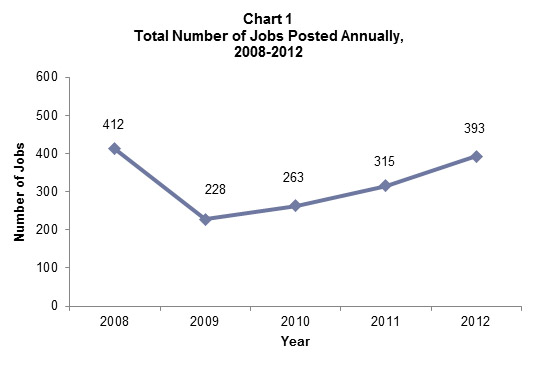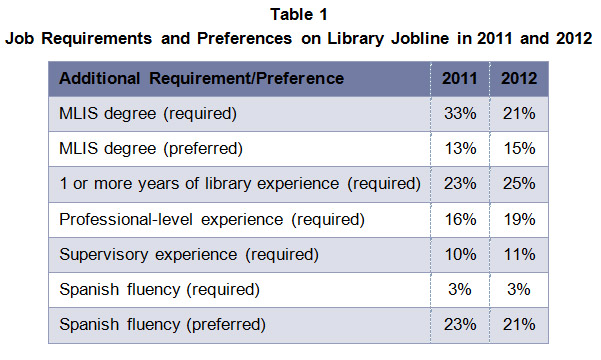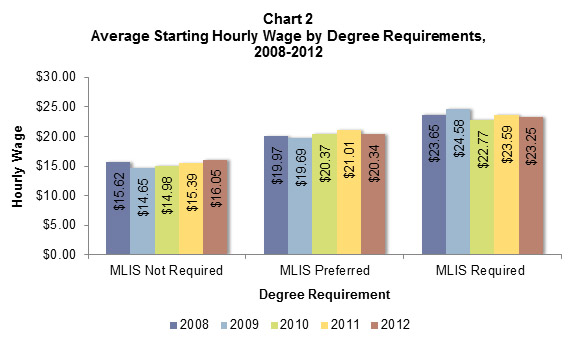Introduction
An examination of data from Library Jobline, a job-posting website operated by the Library Research Service, provides insight into Colorado’s library job climate. The data from 2012 shows that, for the third year in a row, the number of employment opportunities in the field has increased, but the level of compensation for professional-level library positions[note]Positions that require a Master of Library and Information Science or a Master of Library Science degree.[/note] has decreased slightly since 2011.
Job Postings
In 2012, 393 library positions were posted to Library Jobline, thus continuing the upward trend since 2009, when the number was just 228 (Chart 1).[note]These figures reflect the number of jobs posted during each year, in contrast to last year’s Library Jobline Fast Facts, which reported on the number of jobs that were active during each year.[/note] On average, 33 library positions were posted to Library Jobline each month during 2012. Compared with other months, June saw the most postings (49), whereas April saw the fewest (25).
 Subscriptions
Subscriptions
Library Jobline’s website redesign in early 2012 may have contributed to the influx in its subscriptions. An additional 97 employers registered with Library Jobline in 2012—an increase of 19 percent over the previous year—which brought the total number of registered employers to 602. The number of registered job seekers rose by 44 percent, or 729 members, which propelled Library Jobline’s total number of registered job seekers to almost 2,400.
Views
Despite sizeable increases in the number of job postings and the number of registered job seekers, LibraryJobline.org experienced less traffic in 2012 than in the previous two years. In 2012, Library Jobline postings were viewed 521,655 times—down more than 100,000 views from 2011, and more than 200,000 views from 2010. Curiously, more than one-third (37%) of the 2012 views were of jobs that were posted prior to 2012.
The diminished traffic might be partially attributed to job seekers’ reliance on alternative notification channels. By the end of 2012, Library Jobline (@libraryjobline) had accrued 345 Twitter followers (up from 202 at the end of 2011), and tweeted 616 times—159 times more than in 2011. Additionally, Library Jobline generated 272,243 email notifications in 2012, and individual RSS feeds were accessed 64,737 times.[note]Statistics on Library Jobline email notifications and RSS feeds prior to 2012 are not available.[/note]
Requirements and Preferences
About one-fifth (21%) of the Library Jobline postings for 2012 specified that a Master of Library and Information Science (MLIS) degree was required—a decrease from 2011, when one-third (33%) required one (Table 1). An additional 15 percent of job postings in 2012 specified a preference for candidates with an MLIS degree, compared with 13 percent in 2011. The remaining 64 percent either specified that an MLIS degree was not required, or simply included no information about it. The percentage of job postings that listed additional requirements and/or preferences changed little from 2011.
Starting Wages
Compared to 2011, the average starting hourly wage decreased by $0.34 per hour for Library Jobline postings that specified the requirement of an MLIS/MLS degree, and $0.67 per hour for those that listed it as a preference (Chart 2). Conversely, the average starting hourly wage for postings that did not require an MLIS/MLS degree increased by $0.66 per hour. Although this may be unsettling for those who choose to pursue MLIS/MLS degrees, it is too soon to determine whether the decline in compensation for professional-level library jobs since 2011 is a trend.
Conclusion
Library Jobline’s 2012 data offers mixed messages about Colorado’s library job climate. The number of employment opportunities listed with Library Jobline has steadily increased since 2009, and offers hope that it might soon reach pre-recession levels. Unfortunately, average starting hourly wages for library positions posted with Library Jobline do not demonstrate the same upward trend.
Indeed, 5 years of data suggest that starting wages are stagnant overall. Job seekers can likely expect more opportunities for Colorado library employment in the coming years; however, they should not count on higher levels of compensation.

